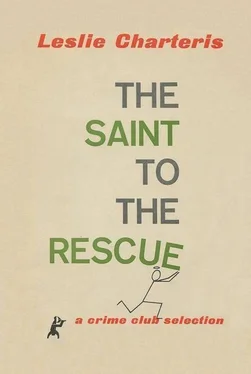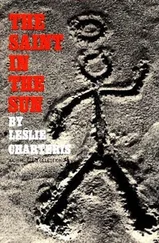“The Law is a wonderful thing, I suppose,” Simon Templar said in one of his oracular moods. “I’ve done a lot of complaining about it in my time, but if it had never existed I wouldn’t have had all the fun of breaking it. And it’s probably a very fine idea that all the wretched little people who can’t take care of themselves should be able to get a fair shake. The trouble is that the same machinery that prevents injustice can also prevent justice.”
He could be more specific about this if anybody wanted to listen:
“If you want to guarantee a man the benefit of any reasonable doubt, you also get a system with built-in loopholes that a sufficiently cunning lawyer can drive a bus through. And then you’ll have a certain number of lawyers who specialize in doing just that — who don’t give a damn how guilty they know their clients are as long as they can pay the bill. In fact, who’d rather defend a man who’s guilty as hell, because the fee can be so much fatter. There’s a lot of boils on the cosmos alive and free today who’d be behind bars or under a slab if it weren’t for that kind of shyster. Sometimes I think those professional cheaters of the Law should be hanged even higher than their customers.”
The Saint did not have to mention what he had done himself to remedy some of the failures of formal jurisprudence, for by that time quite as much as was safe for him was already known about his freewheeling interpretation of justice.
In those days, Mr Carlton Rood was an outstanding example of the type of attorney whose neck might have been in frequent jeopardy if the Saint’s heterodox theories of legal responsibility had prevailed in the statute books.
From the foundation of his first two spectacular acquittals had been built up a reputation for court-room invincibility that had become a legend of his generation. It was a legend that enjoyed some of the advantages of a chain reaction, for every successful defense could be counted on to draw new crops of desperate defendants to his office, and by this date it had reached a point where any cause sufficiently célèbre it was almost mandatory to retain Carlton Rood. Among his grateful clients could be listed some of the biggest names that ever adorned a theatre marquee or a police dossier, and there is no doubt that they all received value for their money.
If there were any tricks of delay, confusion, objection, and obfuscation which Mr Rood did not know, nobody else had ever thought of them either. On the principle that no case was lost until the last appeal had failed, he approached every assignment with a dazzling variety of technical devices primarily designed to postpone any irrevocable result to the remotest possible future, before which prosecutors could lose their steam, judges could grow numb with boredom, and inconvenient witnesses could be overtaken by clouding of the memory or simply die of old age — if not otherwise helped off the scene by interested parties. But when in spite of all shenanigans he was brought to a showdown, he had no peer in the forensic techniques and pyrotechnics of leading, misleading, tripping, trapping, twisting, bamboozling, pleading, bullying, hand-wringing, gamut-running, and plain ham acting that can be employed to obscure an issue or distort a fact.
He was a heavy-set heavy-featured man with a luxurious growth of silver hair which he cultivated to the proportions of a mane. The combination gave him a leonine and statesmanlike aspect of which he was fully aware and which he exploited, to the utmost, enhancing them with the gold-rimmed pince-nez dangling on a wide black ribbon, the string ties, and the dark clothes of slightly old-fashioned cut which are part of the stock cartoon of a Southern senator. On him they looked right and extraordinarily impressive, so that the most hostile jury usually ended up listening to him with respect, in spite of the skeptical attitude which his own publicity had inspired in large cynical sections of the population, which inclined to the view that anyone who went to the expense of hiring Carlton Rood should be presumed guilty until irrefutably proved otherwise.
The verdict in Mr Rood’s latest headline trial was being awaited hourly on a certain day when Simon stopped in Biloxi on the Gulf Coast for gas. While he was waiting for his tank to be oiled, he saw a newspaper van pull up at a tiny shop next door while the driver delivered a bundle of papers. Simon walked over and went in as the van drove away, and found a stout middle-aged woman fumbling with the string that held the package together.
“Can I help you?” he said gallantly.
He deftly loosened the knot, and turned over the top paper. The black type leaped to his eye like a blow: “SHOLTO ACQUITTED.”
It was a result that the Saint would have bet considerable odds against, but for once his gift of prophecy must have succumbed to wishful thinking. Carlton Rood had done it again. But the achievement was so startling that Simon was conscious of suppressing a gasp, and may not have completely succeeded.
“Did he get off?” asked the woman.
She was looking right across the newspaper when she spoke, and Simon suddenly understood why she wore dark glasses in spite of the gloom inside the shop.
“I’m afraid so,” he said gently. “Would you like to know all the grisly details?”
“Thank you, but my niece’ll read it to me when she gets here from school. It doesn’t really matter how he did it, if he got off. I thought this might be one time when he wouldn’t, but I suppose that was too much to hope. I have been hoping it, though — ever since he blinded me.”
She said this in such a matter-of-fact tone that he wondered momentarily if one or the other of them had slipped a cog.
“How was that?” he prompted cautiously.
“Oh, it was nearly twelve years ago, when he was still doing some of his own dirty work. They might have got him for murder then, if it hadn’t been for what happened to me. You probably read about it at the time. My name’s Agnes Yarrow.”
Although there was little criminal news that he had missed since he began to make a notable amount of it himself, and his memory was prodigious, he would have had to admit that he would not always recall everything that had ever happened in the annals of gangsterism from a single reference. But the blind woman quickly relieved him of the need to ply her with questions.
“My husband and I had a small dry cleaning business in Mobile. Sholto was organizing a Laundry and Cleaning Association, as he called it. It was just a racket for him to get ten per cent of everybody’s business, but he let you know that if you didn’t sign up with the Association you wouldn’t have any business. We were the first to refuse to join. One day Sholto came in and started spraying acid out of a flit gun over all the clothes that were waiting to be picked up. I tried to stop him, and I got a squirt of acid in my face. I fell down screaming, and my husband came out of the back room and grabbed him. He took the flit gun away from him and he could have held him, he was a big strong man, but Sholto pulled out a gun and shot him dead and ran away.”
“But he was arrested later, and — Yes, I remember now. Carlton Rood defended him. It was one of his first important successes. But now it comes back, it seems to me that Sholto wasn’t even tried for murder, only for the attack on you.”
“That’s right. I still don’t understand it all, but the District Attorney seemed to get an idea that if he could convict him of the attack first, it’d be much easier to convict him of murder afterwards. But if they couldn’t, they’d save the expense of a much bigger trial.”
“A fascinating idea,” said the Saint. “I wonder if Carlton Rood helped to give it to him.”
Читать дальше












